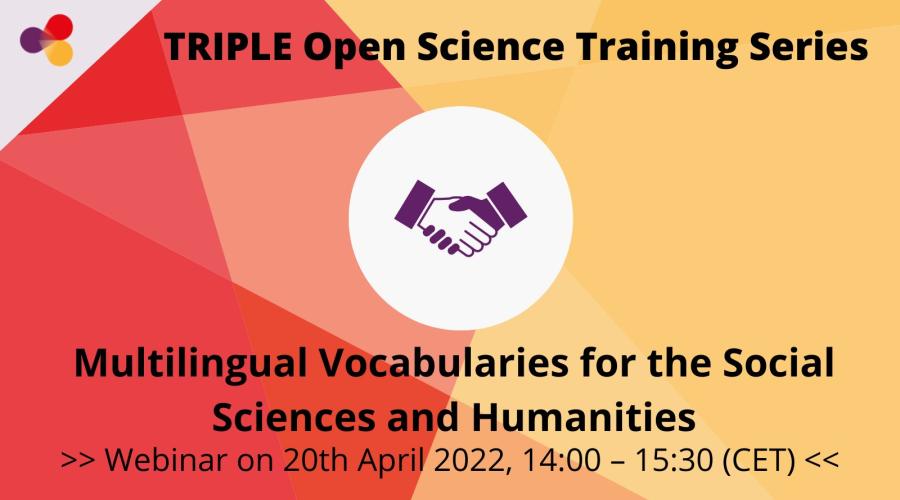
An educational webinar, 'Multilingual Vocabularies for the Social Sciences and Humanities' is being held on Wednesday 20 April 2022 (15.00-16.30) by the National Documentation Centre (EKT) under the European project TRIPLE. The focus of the webinar is the creation, use and management of multilingual controlled Vocabularies in the Humanities and Social Sciences (SSH).
Controlled vocabularies are organized arrangements of words and phrases used to annotate, index and retrieve content through browsing or searching. Multilingualism is an essential feature for the SSH, this is why multilingual SSH vocabularies are greatly needed.
During the cataloguing phase, Vocabularies are necessary for the systematic and consistent use of terms so that the same term always refers to the same concept, the same person, the same place, or the same object. During the information retrieval phase, many users may use different synonyms or more general terms that refer to a particular concept, making it difficult to retrieve the information they desire. The use of Vocabulary makes the search structured and efficient, thus facilitating researchers in the search for resources.
Apart from the other difficulties that appear during the cataloguing and retrieval of content, there is a further complication for the SSH. In these scientific areas, publishing research results in the researcher's native language, and not just in English, is a common practice. Consequently, there is a need to create multilingual Vocabularies that will allow the correlation of terms with each other in different languages.This is the case with TRIPLE, whose purpose is to create the multilingual GoTriple platform, through which the user will be able to search for content in nine languages (English, French, German, Spanish, Greek, Portuguese, Italian , Croatian, Polish).
he training event will provide answers to the following questions, among others: a) What are SSH Vocabularies and why are they so important? b) How to create a multilingual SSH Vocabulary (The TRIPLE case)? c) The large variety of vocabularies and management needs in the SSH. How to build an interoperable infrastructure for vocabularies (The SSHOC case)?
In the webinar of April 20, Nikos Vasilogambrakis (EKT) will make an introductory presentation where he will explain the function of Vocabularies and their importance in the organisation of knowledge and content. Haris Georgiadis (EKT) will talk about the challenges of creating a multilingual Vocabulary, and more specifically the case of the TRIPLE Vocabulary. Daan Broeder (CLARIN ERIC, SSHOC project) will talk about the wide variety of Vocabularies that exist in the SSH and the need to create an infrastructure that will safeguard the interoperability of these Vocabularies. The webinar will be co-ordinated by Iraklis Katsaloulis (EKT).
To attend the webinar, a synergy of TRIPLE and SSHOC projects, you need (free) registration here.
For more information you can contact Iraklis Katsaloulis at ikatsaloulis@ekt.gr.
The TRIPLE project and the GoTriple platform
The European project TRIPLE (Transforming Research through Innovative Practices for Linked interdisciplinary Exploration) aims to address the problems faced by research in the Social Sciences and Humanities (SSH). Some of these problems are: the little use and reuse of the data produced, the limited opportunities for interdisciplinary collaboration and the problem of multilingualism in scientific publications as it is well known that, in SSH, publications are made in the author's native language and not in an international language (English).
At the heart of TRIPLE is the creation of the GoTRiple platform, which is already available in Beta version here.
GoTriple is an innovative multilingual search platform for the Social Sciences and Humanities (SSH). It provides a unique access point for discovering and reusing SSH-related research resources: publications and research data, research project descriptions and researcher profiles. These resources will be automatically imported into the GoTriple platform by aggregators and providers (publications, data, etc.) after they have first been semantically enriched.
The platform allows users to:
• discover and reuse open SSH academic resources in nine European languages (English, French, German, Greek, Spanish, Italian, Croatian, Polish, Portuguese), which are now scattered locally and thematically ,
• find and connect with other researchers and research projects across scientific, language and cultural differences,
• use Innovative tools and services to support research, visualise research results, comment online, and through social media
• seek new ways to fund their research, such as crowdfunding.
A brief presentation of the GoTriple platform can be seen in the following video https://youtu.be/4HCNt1nZ2I0
EKT's role in TRIPLE
As a project partner, EKT has an important role in creating and controlling the processes through which data and metadata are collected and homogenised on the GoTriple platform, using both existing databases and new ones that will be added during the operation of the platform. It contributes both to finding the best practices for this process and to tackling the problems that arise during the implementation of these practices. Proper categorisation of data and metadata in the nine languages (English, French, German, Spanish, Greek, Portuguese, Italian, Croatian, Polish) managed by the platform is crucial. EKT is actively involved in this effort, in collaboration with partners, by creating vocabularies that relate scientific terms to different languages. The GoTriple platform targets SSH researchers, who will be the main users of the infrastructure that will be created and the services that it will provide. An important part of the TRIPLE project is the identification of user needs and expectations of such an infrastructure so that these needs and expectations are taken into account in its design. EKT contributes to this process, both with its know-how in the design and operation of such infrastructure and with the knowledge and research it conducts within the project and independently on Open Science and the needs of users.








